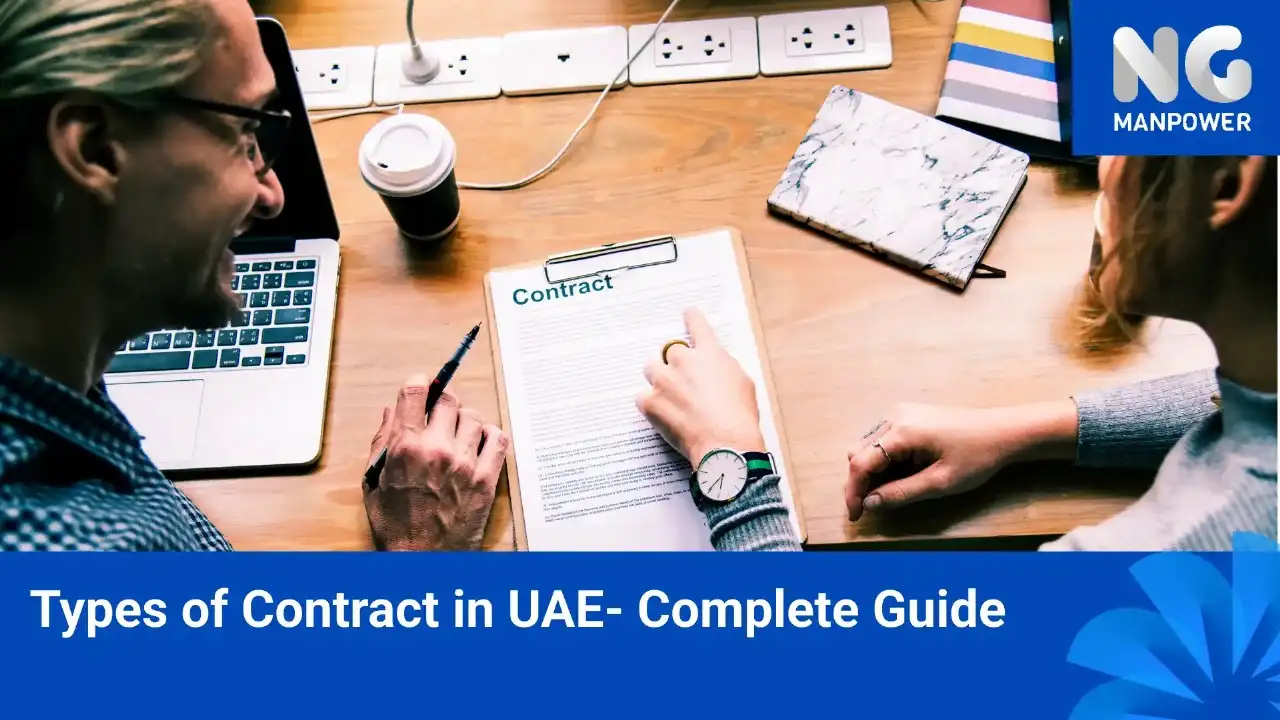Maintaining the employment sector, the labor contracts in UAE play a significant role. This law enlightens the rights and responsibilities of both employees and employers. This makes it essential to understand and follow these rules in order to stay compliant. Leading to the unstoppable growth of your enterprise or business, the legal way is the only way towards prosperity.
The experts of NG Manpower crafted this guide to help you get the clear vision of labor contract in the UAE overview. With a comprehensive overview of a labor contract in the UAE, you will learn about the vital aspects of drawing a Dubai labor contract. With changes towards more economical stability in the global market, the labor limited contracts UAE are structured and practiced. Read along and discover everything you need to know.
 Understanding the Limited Contract in UAE
Understanding the Limited Contract in UAE
The limited contract in the UAE has redefined the employment sector, considering the terms between employees and employers In the UAE. Contracts like these are set on limited duration, reflecting the temporary nature of the professional realm.
However, these agreements can be shaped according to the employers’ will, following the labor laws. With this, it is easier for the employees to understand the maze of rights and obligations with vigilance and discernment. The limited contract UAE has a temporal essence with the clear terms, avoiding any complexity. Strategic implementation is required to keep both parties on the right track.
Key features of UAE Limited Contracts 2025
For the establishment of fixed-term employment relationships, these contracts are designed to be clear, having strong terms and conditions. Not only it ensures compliance with labor laws, but also protects the interests of both employers and employees. Therefore, understanding the key features of limited contracts is important to embrace the UAE’s workforce landscape.
Duration of Limited Contracts
The duration of limited contracts is a defining characteristic, as UAE labor laws in 2025 require these agreements to specify a clear start and end date. Typically lasting one to three years, the duration can be adjusted as long as it complies with legal regulations. In case of contract expiry, contracts can be renewed if mutually agreed upon, with renewal terms adhering to the latest guidelines. The fixed-term nature ensures both parties commit to the agreed timeline but may result in financial penalties or compensation if terminated early. It is crucial for employers and employees to evaluate contract durations carefully to align with their goals and expectations.
Employer and Employee Obligations
For limited contracts to work effectively, both employers and employees must fulfill their respective obligations. The UAE Labor Law explicitly outlines these responsibilities, ensuring mutual accountability:
Employer Obligations
- They must pay salaries timely while providing the determined benefits such as annual leave, sick leave, and gratuity. Following the Wage Protection System or WPS is also important.
- It is their responsibility to provide a safe and sound working environment for a compact workplace.
- Employers must draft contracts in accordance with UAE labor laws and register them with the Ministry of Human Resources and Emiratization or MOHRE.
Employee Obligations
- Employees should complete all the duties mentioned in the contract on time.
- They must follow workplace policies, respect confidentiality agreements, and avoid actions that could harm the company.
- If resigning, employees must provide the agreed-upon notice period, usually specified in the contract.
Renewability of Limited Contracts
The limited contract, if reaches to its expiry, can be renewed by mutual agreement of the parties involved. The new regulations emphasize on the clear information about the renewal terms in the original contract. If an employer or employee does not wish to continue with the contract, they must give one month’s notice till the date of contract expiration.
End of Service Benefits in Limited Contracts UAE
Employees who are employed under the limited contracts in the UAE are entitled to end-of-service benefits. It is estimated by the duration of employment. These benefits include gratuity payments. This increases with years of service, provided the employee has completed at least one year with the employer. The calculation considers basic salary and excludes allowances, ensuring a fair reward for an employee’s dedication during the contract term.
Termination of Limited Contracts in the UAE
Termination of a limited contract before its end date requires valid reasons and adherence to legal procedures. Employers must provide compensation or notice, while employees may face penalties if they resign prematurely without justification. Grounds for termination include misconduct or mutual agreement, with both parties encouraged to resolve disputes amicably to avoid legal repercussions.
Resignation Under a Limited Contract
If you are on a limited contract in the UAE, you need to serve the agreed notice period and pay compensation for early exit. Along with this, the one who is resigning must ensure their resignation aligns with labor laws to avoid any legal breaches. This can be prevented only by open communication between the employer and employee. This must be followed with adhering to the contract’s terms for a smooth transition.
Visa and Employment Implications of Limited Contracts
Limited contracts go hand-in-hand with the employment visas in the UAE. The duration of the visa usually matches with the contract’s term. However, the case of early termination or resignation can lead to visa cancellation. This way, the employees are required to either transfer sponsorship or exit the country. Employers need to handle visa formalities while following compliance with UAE immigration regulations.
Pros and Cons of Limited Contracts For Employees
| Aspect | Advantages for Employers | Disadvantages for Employers |
| Workforce Management | Flexibility to adjust workforce based on business needs, ideal for peak seasons or short-term projects. | Difficulty attracting top talent due to the preference for stable, permanent roles. |
| Cost Predictability | Clear contract end dates make budget and financial planning easier. | High employee turnover increases recruitment and training costs, disrupting team cohesion. |
| Employee Evaluation | Acts as a probationary period to assess employee performance before permanent hiring. | Risk of legal challenges, such as fixed-term employees gaining permanent status after four years. |
| Specialized Skills | Enables hiring of niche experts for technical or specific projects without long-term commitments. | Employees may lack commitment compared to permanent staff, impacting productivity and morale. |
Pros and Cons of Limited Contracts UAE For Employees
| Aspect | Advantages for Employees | Disadvantages for Employees |
| Flexibility and Variety | Opportunity to work on diverse projects and with various employers, offering career variety. | Less job security compared to permanent roles, leading to uncertainty and stress. |
| Compensation | Often higher pay rates for short-term roles to attract talent. | May lack benefits such as health insurance, retirement plans, and paid leave. |
| Career Opportunities | Potential pathway to permanent roles if performance and fit are favorable. | Limited opportunities for career advancement, including promotions and development programs. |
| Skill Development | Exposure to different projects enhances skills and broadens experience, improving employability. | Risk of sudden job loss if the employer ends the contract early, causing financial instability. |
UAE Labour Law Updates on Limited Contracts (2025)
The UAE Labour Law updates for 2025 have simplified streamlined employment contracts by requiring all workers to be on fixed-term (limited) contracts, replacing the previous option for unlimited contracts.
Mandatory Limited Contracts:
All employees must now be on fixed-term (limited) contracts, replacing the previous unlimited contracts.
Maximum Contract Duration:
The duration of limited contracts cannot exceed three years but can be renewed or extended upon mutual agreement.
Enhanced Clarity:
The amendments aim to provide clear terms regarding job duration, renewal, and termination, ensuring better understanding between employers and employees.
Termination Guidelines:
Stricter rules apply for terminating contracts, including specific notice periods and compensation entitlements.
Transition Period:
Employers were given a transition period to align existing unlimited contracts with the new limited contract requirements.
Employee Rights Protection:
The changes include safeguards to prevent unfair termination and ensure proper end-of-service benefits.
Compliance Requirements:
Both employers and employees must ensure their contracts meet the new standards to avoid legal or financial penalties.
Flexibility for Employers:
Limited contracts allow businesses to manage workforce needs more effectively for short-term or project-based roles.
Conclusion
It is crucial for both employers and employees to understand limited contracts in the UAE in order to maintain equitable and seamless working relationships. These contracts provide structure and transparency by outlining clear terms and durations. Always read the terms carefully and stay informed about your rights and responsibilities under UAE labor law. A well-informed approach results in a more rewarding and legally secure employment experience.
If you are interested, contact us now and get in touch with our expert.


 Understanding the Limited Contract in UAE
Understanding the Limited Contract in UAE

